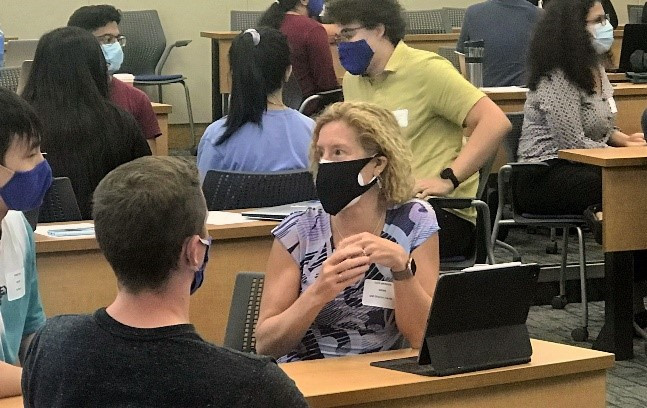Materials science and engineering education at Duke University is growing, despite the challenges of the global pandemic. Over the past year, DMI faculty have taught classes both virtually and in-person with precautions in place and conducted research with graduate students locally and around the globe to keep the momentum of their robust training programs going.

In Fall 2021, Duke’s National Science Foundation-funded Research Training program (NRT), aiM (AI for Understanding and Designing Materials), led by Cate Brinson, welcomed a new cohort of 12 PhD students. They hail from a range of departments (Mechanical Engineering & Materials Science, Biostatistics & Bioinformatics, Chemistry, Civil & Environmental Engineering and Mathematics), fulfilling the program’s mission of interdisciplinary training in the use of artificial intelligence to accelerate discovery, design and application of new materials. Added to last year’s initial cohort of seven, the program now has 19 total trainees.
This program will fill a critical gap in preparing the next-generation advanced manufacturing workforce to develop on-demand materials for vital societal applications across an array of sectors, including flexible electronics, biomedical implants and infrastructure development.

DMI faculty also collaborated across disciplines to develop a new undergraduate certificate in materials science and engineering. Launched in Fall 2021, it is open to all Duke undergraduates and hosted by the Thomas Lord Department of Mechanical Engineering & Materials Science (MEMS). Like the interdisciplinary field itself, the certificate’s course offerings and faculty span the intersection of physics, chemistry and engineering. Students will gain rigorous, in-depth exposure to fundamental principles in the core disciplines of materials science and engineering, including polymers, photovoltaics, computational materials science, metallic structures, advanced biomaterials, nanophotonics and more.

Meanwhile, the University Program in Materials Science & Engineering (MSE), begun in Fall 2018 and led by Adrienne Stiff-Roberts, continues to grow as well. The program added its largest cohort to date of Master of Science students this semester. The MSE offers a unified curriculum where PhD students feed from one of eight Duke University departments and master’s students apply directly to the program. The Master of Science program has graduated 13 students to date, with more than half going on to a PhD program–many within Duke’s MSE program–with the remaining going to work in industry.
Sanket Hedduri, a May 2021 graduate with a master’s degree from the University Program in Materials Science & Engineering, is now in Portland, Ore., doing materials science for Intel as an engineer in the chip fabrication facility.

Hedduri said the support he received from Duke faculty and Career Services staff prepared him well for his current role.
“My advisor [DMI faculty member Jeff Glass] gave me the freedom to do my own project, which is really cool,” said Hedduri. “This atmosphere of supportive of collaboration and of great research that's going on here at Duke makes the program a great option.”
There are many options for graduate study in materials science and engineering at Duke University to fit the specific goals of each student. The integrated MEMS department offers three flexible curriculum tracks in materials science at the PhD level and two master’s-level degree programs in materials science. Both MSE and MEMS offer “4+1” bachelor’s and master’s programs. Additionally, many of the other seven partner departments (Biomedical Engineering, Electrical & Computer Engineering, Civil & Environmental Engineering, Chemistry, Physics, Mathematics and Biology) offer degree programs which can emphasize materials science within the context of their disciplines. Finally, a graduate certificate in materials science and engineering is being submitted for approval by the Graduate School to further enhance training options.
